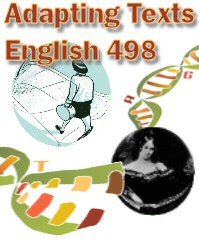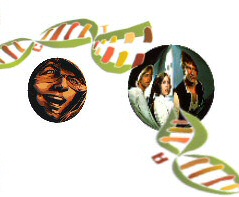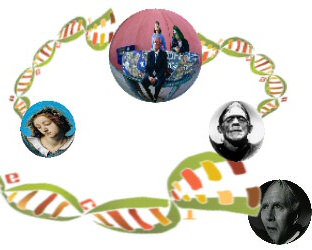|
|
Adapatation Project Proposal Assignment
Length and Due Dates
Length: 3-4 pages, formated as described in the "Essays" portion
of the syllabus
Due: Tuesday, May 30; bring to class in two electronic
formats
Assignment
The proposal assignment allows writers of critical analyses to
develop a tentative thesis, pose arguments related to the thesis,
identify potential evidence and consider organizational and design
strategies for the adaptation project. Students who author creative
projects will use the proposal stage to describe the narrative
they will compose, discuss how their proposed creation relates
to the source, other adaptations, and theory, and sketch out organizational
and design choices. In completing the proposal, all students will
produce a roadmap to guide the drafting process.
Although the proposal can take a variety of formats, it should
include the following components:
| Critical Project |
Creative Project |
- A tentative title for the project.
|
- A tentative title for the project.
|
- The titles of the source and adaptations you will analyze.
|
- A description of the creative work you will produce. Identify
what you will produce (story, poems, film, game, etc.)
and outline the plot, thematic focus, or game movement. If
you
will present a short piece of a longer text—for example,
a scene from a film—explain the plot elements you
will focus on in the scene.
|
- A tentative thesis: What argument do you plan to make
about the source and its adaptations?
|
- A brief discussion of how your work responds to or incorporates
other versions of the same source and connects to adaptation
theory.
|
- Discussion of supporting claims: What points will you need
to make in order to develop your thesis?
|
- Site organization: Describe how the site will be organized.
What information will you put on which page (one page for
creative work, one for critical introduction, one for links;
separate
pages for in-depth scene and overall plot summary, etc.)?
What navigation elements will you include (links to all parts
of
site on each page, links to main page only on each page,
etc.)? If you wish, you may draw a chart that shows how the
site’s
pages will connect to each other. Specify how you want viewers
to proceed through the site.
|
- Discussion of evidence: What evidence will you use to support
each of your points?
|
- Site design: What color scheme will you use? How will you
arrange elements on each page? If you wish, you may draw a
picture or use Composer to create a page template.
|
- A description of how your project incorporates adaptation
theory.
|
- A list of any questions you have regarding your ideas-in-progress.
|
- Site organization: Describe how the site will be organized.
What information will you put on which page (one page for
analysis, one for links, one for “about”; separate pages
for various texts analyzed, etc.)? What navigation elements
will you include (links to all parts of site on each page,
links to main page only on each page, etc.)? If you wish, you
may draw a chart that shows how the site’s pages
will connect to each other. Specify how you want viewers
to proceed
through the site.
|
|
- Site design: What color scheme will you use? How will you
arrange elements on each page? If you wish, you may draw a
picture or use Composer to create a page template.
|
|
- A list of any questions you have regarding your ideas-in-progress.
|
|
While I have listed the elements you should include, you can address
them in an order you wish. For example, you may integrate the tentative
thesis and the discussion of evidence into the outline of supporting
claims, or you may first explain your creative work connects to
theory and other adaptations of the same source before you describe
the work itself. Feel free to incorporate anything else that will
help you draft the project (excerpts from your electronic postings;
quotations others’ electronic responses; excerpts from class
notes or previous papers, etc.). You may also integrate images
into the proposal, particularly if you discuss game or film scenes
you will analyze. If you include images, you can capture screen
shots from a personal DVD or conduct a Google
image search.
Last Update: 5/20/06
|



